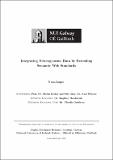| dc.description.abstract | In enterprises different software applications are used to manage specific functions: customer relations, human resources, and manufacturing, each requiring specialised software. Relational databases are commonly used as the underlying storage mechanism for most of these software applications, often causing the same entities to be replicated in independent databases. In order to obtain an accurate overview of an enterprise, these independent data sources need to be combined. This hard task is commonly known as data integration and becomes even more difficult if we consider that the original data sources can be stored according to heterogeneous models. The Extensible Markup Language (XML) has become widely used on the World Wide Web (WWW) and in order to reuse Web data, XML needs to be included into the data integration process along side relational databases.
The Linking Open Data (LOD) initiative has also increased focus on another data model: the Resource Description Format (RDF). With the increasing availability of structured information on the Web, exposed following the Linked Data principles, RDF has also become an attractive format for representing integrated data, allowing existing enterprise data to be enriched, by connecting it to other data on the WWW.
Established approaches for data integration involve the development of custom applications that bridge the different sources and data formats. In this thesis we propose to make this bridge via a query and transformation language and propose optimisations for such a language that aim at reducing the execution times of the transformation queries.
RDF is already regarded as a useful format for representing integrated data but we argue that an extension of the RDF data model is necessary. This extension, which we call Annotated RDFS, allows us to represent domain-specific meta-information about the integrated data. For instance, defined Annotated RDFS domains allow temporal or provenance information to be maintained. Temporal information can help to determine the most up-to-date data, while provenance information can help to track information back to their original sources.
The language introduced in this thesis, called XSPARQL, combines different standard query languages - SQL, XQuery, and SPARQL - for accessing the heterogeneous data sources - relational, XML, and RDF data, respectively - and transforming between the different formats. The XSPARQL language also extends the SPARQL query language to allow for easily writing RDF transformations that can otherwise be cumbersome to write in SPARQL.
By further extending XSPARQL to support querying and creating Annotated RDFS, XSPARQL also allows meta-information to be extracted and attached to RDF triples. We illustrate this approach by introducing a use case where enterprise data from different systems is integrated and annotated with data from a novel Annotated RDFS domain: access control. This new domain maintains information regarding which agents are allowed to access the integrated information by replicating any access control information present in the original sources. We also propose a framework based on this new annotation domain that can enforce the access restrictions attached to each triple. | en_US |


